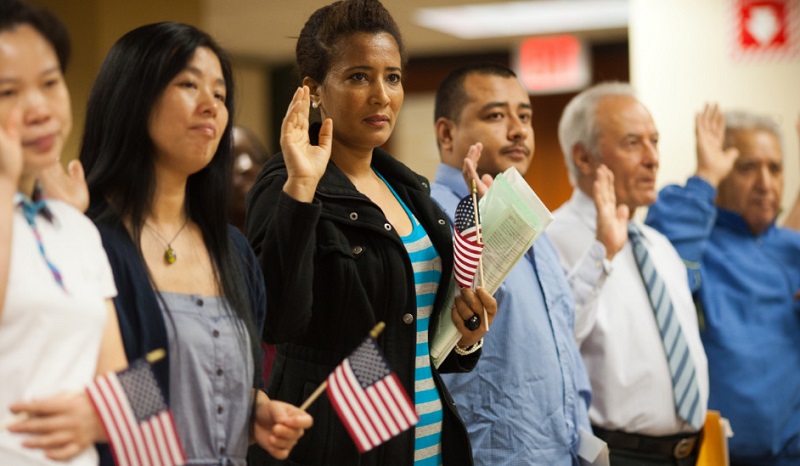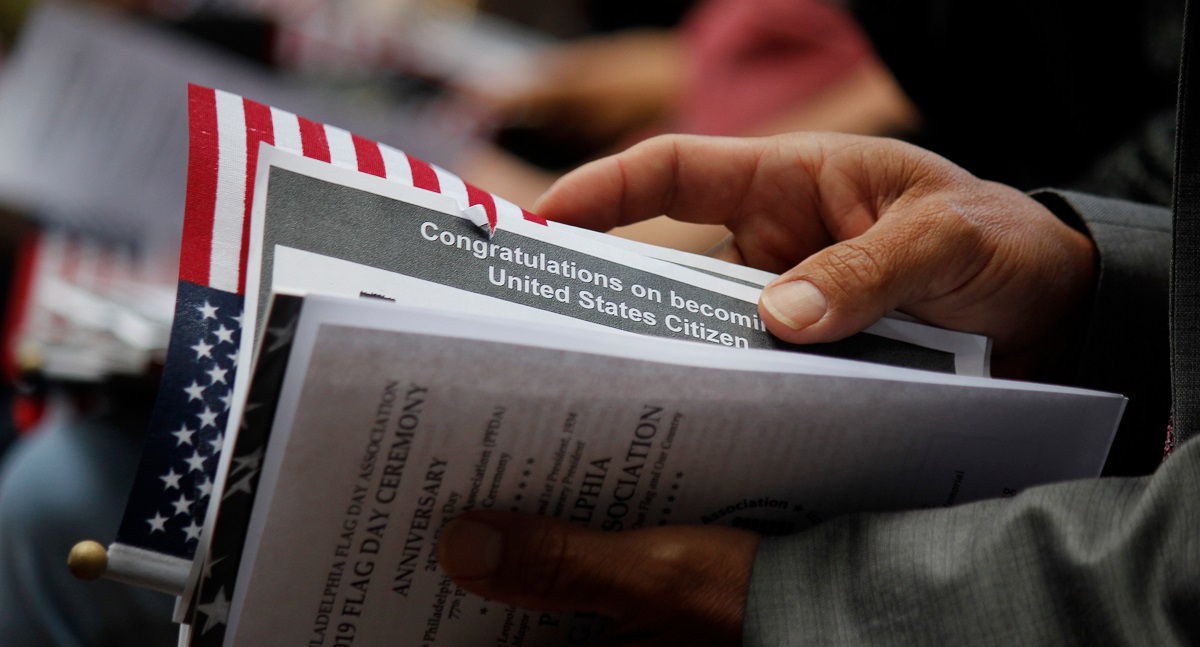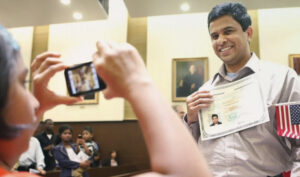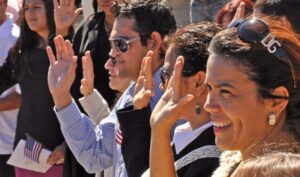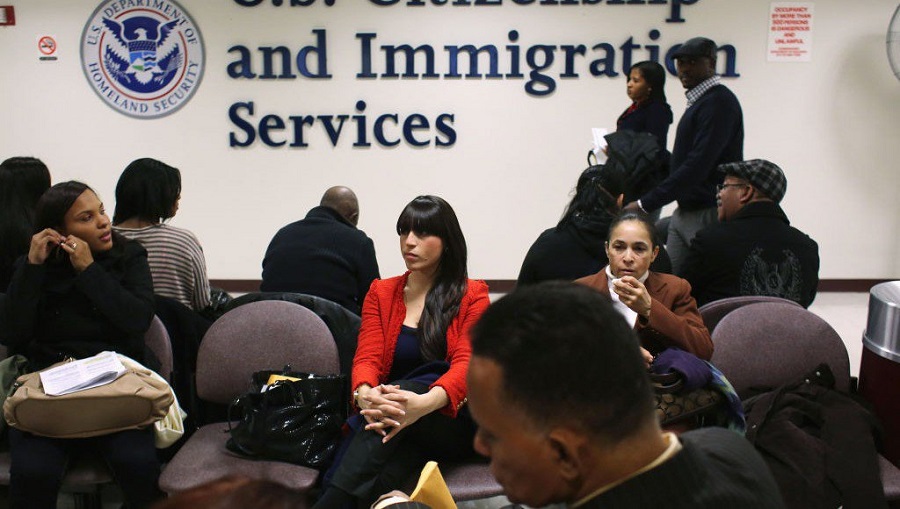
The naturalization interview is one of the final and most important steps in becoming a U.S. citizen. It can feel intimidating, especially if you're unsure what to expect. But with preparation and a clear understanding of the process, you can walk into your interview with confidence.
This guide breaks down what happens at a USCIS naturalization interview, including which documents to take, how the interview works, what the officer looks for, and how to prepare for the English and civics test.
What Is the Naturalization Interview?
After submitting Form N-400, Application for Naturalization, U.S. Citizenship and Immigration Services (USCIS) will schedule you for a biometrics appointment. Once that’s complete, the next big step is the naturalization interview. The purpose of the interview is to:
- Review your Form N-400 for accuracy and updates
- Test your ability to speak, read, and write in English
- Administer the civics test
- Evaluate your moral character and eligibility for citizenship
The USCIS officer will ask questions directly related to the information in your application. They are checking for honesty, eligibility, and your understanding of U.S. government and history.
When and Where Does It Happen?
Once USCIS is ready to interview you, they will mail you an appoinment notice (Form I-797C, Notice of Action) with the date, time, and location. Interviews generally take place within 6 to 12 months after submitting the N-400, though processing times vary. It is possible to reschedule the appointment if necessary, but this will delay your case.
This interview typically takes place at a USCIS field office near you. It’s critical to arrive early, dress neatly, and take all required documents. Your appointment notice will also outline the documents you should take to the appointment.
Which Documents Do I Take to the Naturalization Interview?
After filing the N-400 application, maintain a folder that contains a copy of your application, originals of all supporting documentation, and any communication you receive from USCIS. This early preparation will help you stay organized and prepared for the interview day.
Start by reviewing your personalized filing instructions from CitizenPath. Our instructions give you a simple list of items to take to the naturalization interview that has been customized based on your application. But make sure you have all items requested in the USCIS appointment notice.
Documents that you must take your naturalization test and interview include:
- Interview appointment notice
- Permanent resident card (also known as a green card)
- Your driver’s license or other state-issued identification card
- All current and expired passports and travel documents
Depending on your individual case, you may need to have other items with you when you appear for a naturalization interview. Take original documents unless otherwise indicated. Depending on your N-400 answers, you may need to take these items:
Marital Status
Take evidence of your current marital status. Examples of acceptable documents include a marriage certificate, divorce decree, annulment decree, or death certificate of former spouse.Termination of Prior Marriages
If you’re currently married, you must be able to prove that all of your previous marriages (if applicable) and your current spouse’s previous marriages have been terminated. Examples of acceptable documents include divorce decrees, annulment decrees or death certificates.Filing as a Spouse of a U.S. Citizen
If you filed Form N-400 on the basis of marriage to a U.S. citizen, you’ll need to prove that your spouse has been a U.S. citizen for at least three years and that you and your spouse lived in marital union for at least three years. In addition to the marriage certificate, take documents such as tax returns, lease agreements, bank statements, utility bills, car titles, insurance statements, and any other documents during the three-year period that help establish proof of your marital union.Tax Returns
Take evidence that you have complied with your obligation to file an income tax return for at least the past five years (three years if filing on the basis of marriage to a U.S. citizen). Take copies of your complete tax returns or an IRS Tax Transcript listing tax information for the requisite years. You can obtain a free IRS Tax Transcript on the IRS website.Children
Take evidence that all of the children listed on your naturalization application are your children. Examples of acceptable documents include birth certificates or adoption decrees.Support for Dependents
If you have dependent children living apart from you, take evidence to establish that you support each dependent child and that you have complied with child support obligations. An inability to prove this may lead to a denial of naturalization due to not meeting the good moral character requirement. Examples of acceptable documents include cancelled checks, money order receipts, a court or agency document showing child support payments, evidence of wage garnishments, or a letter from the parent or guardian of the child(ren).Overdue Taxes
If your payment(s) of any federal, state, or local taxes are overdue, take a signed agreement from that tax agency showing that you have arranged to pay the taxes you owe, and documentation from the same agency showing the current status of your payments.Selective Service Registration
If you are a male who lived in the United States any time between your 18th and 26th birthdays, take proof that you registered for the Selective Service. (This does not include living in the U.S. as a lawful nonimmigrant.) Use the Selective Service Online Verification to generate a verification letter.Absences from the United States
If you have taken any trip(s) outside the United States for more than six months but less than one year, take documentation to establish that you maintained continuous residence in the U.S. during your absence. Failure to prove you maintained continuous residence may lead to a denial of your application. Examples of acceptable documents include documentation to show that you did not terminate employment in the U.S., did not obtain employment while abroad, your immediate family remained in the U.S., and/or you retained full access to your place of residence in the U.S. We also recommend that you speak to an immigration attorney before attending the interview.Certified Court Records
If you were ever arrested, detained, or convicted, you will need to take evidence of the disposition for each incident. We highly recommend that you speak to an immigration attorney to properly address this situation before attending the interview.
You do not need to offer any of the information listed above until asked by the USCIS officer conducting your naturalization interview. In many cases, the officer won’t even ask for some of these documents. If you have the information ready, you’ll avoid delays and be on your way to U.S. citizenship.
What Happens During the Interview?
Your USCIS officer will call you from the waiting area and escort you to a private interview room. Before the interview starts, you’ll be asked to take an oath to tell the truth.
Then, the officer will begin reviewing your Form N-400. They'll go through your answers to confirm that everything is still accurate. USCIS officers, during the Trump administration, have taken an extremely thorough approach to this review. Be prepared to review every single answer. Take the time to review your application before the interview so that you are familiar with each question.
Key Areas the Officer Will Cover
- Personal background
- Travel outside the U.S.
- Marital history and family relationships
- Employment and residence history
- Affiliation with organizations or the military
- Moral character and any criminal history
It’s important to answer truthfully and confidently. If you don’t understand a question, ask the officer to repeat or explain it.
Changes Since Filing Form N-400
If any personal information has changed since you filed Form N-400, it's essential to inform USCIS during your naturalization interview. This includes updates to your name, address, marital status, employment, travel history, or any legal issues. Such changes can impact your eligibility for naturalization, so transparency is crucial.
- Name Changes: If you've legally changed your name, bring the official documentation, such as a marriage certificate or court order.
- Address Updates: Even if you've already notified USCIS, confirm your current address during the interview to ensure all records are accurate.
- Marital Status: Changes like marriage, divorce, or separation should be disclosed, along with relevant documents like marriage certificates or divorce decrees.
- Employment Changes: If you've changed jobs or employers, provide details about your new position and employer.
- Travel Outside the U.S.: Any trips taken after submitting your application should be reported, especially if they were lengthy or frequent.
- Legal Issues: Disclose any arrests, charges, or legal proceedings, even if they didn't result in a conviction. Bring all related court documents.
By proactively addressing any changes since filing your N-400, you demonstrate responsibility and integrity, which are important qualities for U.S. citizenship.
The English Test
Unless you qualify for a citizenship test waiver or exemption, you'll be tested on your English reading, writing, and speaking skills.
- Speaking: The officer will evaluate how well you understand and respond to questions during the interview.
- Reading: You must read one sentence aloud correctly from a list of prepared sentences.
- Writing: You must write one sentence correctly as dictated by the officer.
You don’t need perfect English, but you must be able to understand and communicate basic information.
The Civics Test
The civics portion tests your knowledge of U.S. history and government. Even if exempt from the English test, you will need to take the civics test in the language of your choice or qualify for a waiver.
USCIS provides a list of 100 possible questions. During the interview, you'll be asked up to 10 questions. You must correctly answer at least six to pass. However, if you are unable to answer six out of 10 questions correctly, the naturalization interview will stop. USCIS will reschedule a appointment to re-take the test on another day (within the next 90 days).
Several FREE study tools are available to help you prepare for the history/civics portion of the test.
What Happens After the Interview?
At the end of the interview, the USCIS officer will let you know the results:
- Approved: If all goes well, USCIS may approve your application on the spot. You’ll receive a notice with the time and date of your naturalization oath ceremony.
- Continued: If USCIS needs more information or you didn't pass part of the test, your case may be continued. You’ll receive instructions for follow-up actions.
- Denied: If you don't meet the requirements, USCIS may deny your application. They will provide a written explanation and information on how to appeal or reapply.
If you fail the English or civics test, you get one more opportunity to retake the failed portion, usually within 60 to 90 days.
How CitizenPath Helps
CitizenPath provides simple, affordable, step-by-step guidance through USCIS immigration applications. Individuals, attorneys and non-profits use the service on desktop or mobile device to prepare immigration forms accurately, avoiding costly delays. CitizenPath allows users to try the service for free and provides a 100% money-back guarantee that USCIS will approve the application or petition. We provide support for the Naturalization Package (Form N-400) and several other immigration services.
The USCIS naturalization interview is a critical step in becoming a U.S. citizen. While it may seem stressful, understanding the process and preparing well can make it much easier.
With careful preparation and support from resources like CitizenPath, you're one step closer to calling yourself a U.S. citizen.
Want more immigration tips and how-to information for your family?
Sign up for CitizenPath’s FREE immigration newsletter and
SAVE 10%
on our immigration services


